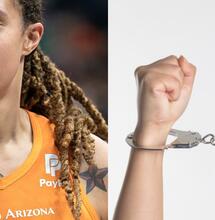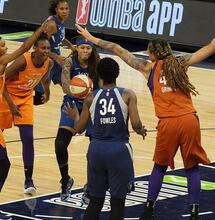The Case of Brittney Griner

Women's basketball star Brittney Griner was arrested at a Moscow airport earlier this year allegedly for possession of cannabis vape cartridges. As of last week, the United States government considers Griner to be "wrongfully detained" by Russia, and it now appears that more significant efforts will be made to secure her release.
Brittney Griner has been all over the news during the last couple of days. The basketball star played for Russia's UMMC Yekaterinburg when she was detained in February on cannabis-related charges.
The latest development in Griner's case is that now the U.S. government is getting more involved in an attempt to get the A-list player out of Russia.
"The welfare and safety of U.S. citizens abroad is among the highest priorities of the U.S. government," the State Department said a week ago. "The Department of State has determined that the Russian Federation has wrongfully detained U.S. citizen Brittney Griner.
"... The U.S. government will continue to undertake efforts to provide appropriate support to Ms. Griner," it said.
Griner has been detained for over 80 days now. Officials and other sources close to her have so far declined to comment on what led to the shift or if there has been any discussion about what it would take to bring her home.
But one thing is sure. The U.S. government will no longer wait for Griner's case outcome in the Russian legal system. Instead, it will effectively seek to negotiate her return by involving high-level officials. One of them is Bill Richardson, the former U.S. ambassador to the United Nations, who was recently involved in releasing the former U.S. Marine Trevor Reed, who had been detained in Russia since 2019.
Reed was exchanged for a Russian citizen convicted of drug smuggling. The deal has been interpreted as a sign that diplomatic channels between U.S. and Russian officials remain open, despite Russia's ongoing war in Ukraine.
Richardson has an extensive experience as an international hostage negotiator, and he has agreed to get involved in Griner's case, it was confirmed last week.
Until last week, the State Department had instructed Griner's personal team to keep a low profile on the case, purportedly as not to make her a valuable asset to Vladimir Putin's government.
The Special Presidential Envoy for Hostage Affairs Roger Carstens has further been commissioned to lead the interagency team for securing Griner's release from Russia. Nevertheless, officials clarified that Carsten's involvement does not mean that the basketball star is considered a hostage, which is a different legal classification than a wrongfully detained person.
Press secretary Jen Psaki told reporters last week that any shift in the White House's approach to Griner's case will be coordinated with the State Department and Carstens.
"Typically — and I don't believe this will change — in order to leave the space to have an outcome we all want and desire — which is to bring her and any American detained or unjustifiably detained home — we typically don't talk about it extensively," Psaki said.
The WNBA player's union also came forward with a statement. "Having learned that the U.S. government has now determined that BG is being wrongfully detained we are hopeful that their efforts will be significant, swift and successful."
"The WNBA is in constant communication with the U.S. government on Brittney's case, working together to get her home safe and as soon as possible," it said.
Griner, who plays during the WNBA offseason for a Russian team, was arrested in February at a Moscow-area airport upon entering the country. Russian prosecutors alleged that she carried vape cartridges containing hashish oil, an accusation that can result in up to 10 years in prison.
The basketball player has not been formally charged, however, a Russian court extended Griner's time in custody until at least May 19, when she is scheduled to have a hearing.
The State Department has not offered any explanations for how its representatives concluded Griner's detention was wrongful. The shift in the government's view on Griner's case does not mean that Russian authorities will change their official stance on her detainment, however, it does say that the U.S. sees the legal proceedings as irrelevant to her case.
Griner was supposedly earning over $ 1 million from her Russian contract, far more than WNBA's maximum base salary of about $230,000. Her team, UMMC Yekaterinburg, has previously paid even higher sums for foreign players to play exclusively in Russia. One of them is Diana Taurasi, who was contracted for $1.5 million in 2015, given that she skips the WNBA season. The vast amounts of money paid to foreign players in Russia are often sponsored by Russian oligarchs, who are now targetted by Western sanctions.
Brittney Griner may be the last American basketball star in Russia, the New York Times wrote in its recent coverage of the case.
"The atrocities of the war in Ukraine and Griner's detention in Russia on drug charges could cut off a lucrative pipeline for women's basketball players," the newspaper wrote.














